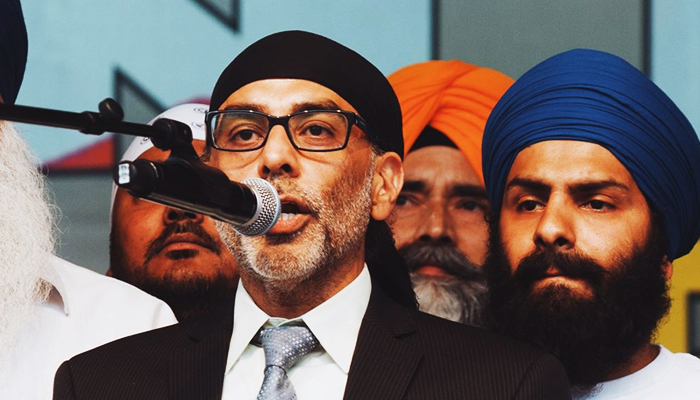
[ad_1]
Indian army has been engaged in genocidal violence in IIOJK for decades, says SFJ leader

NEW YORK: Gurpatwant Singh Pannun, the legal advisor and spokesperson for Sikhs for Justice (SFJ), stated that the recent attack on Indian soldiers in occupied Kashmir was a result of India’s aggression against Kashmiris.
In a statement, he said the Indian Illegally Occupied Jammu and Kashmir (IIOJK) is a globally acknowledged disputed region where the Indian army has been engaged in genocidal violence for decades.
He said the only peaceful resolution to the dispute of occupied Kashmir is to hold a referendum to determine the will of the indigenous people. From Khalistan to Kashmir, the occupier is India and the solution is a referendum.
Commenting on the attack on the Indian army in Kashmir, he stated that the casualties suffered by the military underscore the ongoing cycle of violence triggered by violence itself.
Three Indian soldiers were killed and three others injured after an army vehicle was attacked in Poonch district of IIOJK.
He emphasized that akin to the SFJ conducting the Khalistan Referendum to contest Punjab’s ties with India, Kashmiri freedom fighters should collaborate and organise a referendum for Kashmir’s Independence.
India has labeled Pannun a terrorist, a claim he refutes, asserting that he is an activist.
These accusations emerged approximately two months after Canadian Prime Minister Justin Trudeau accused India of being linked to the murder of another Sikh separatist leader, Hardeep Singh Nijjar, who was fatally shot outside a Sikh temple in Canada on June 18.
The diplomatic dispute has strained relations between India and Canada. In a CBC interview, Trudeau explained that he made the allegations against India publicly after weeks of private diplomacy.
His goal was to discourage any purported agents contemplating further attacks in Canada by “putting a chill on India.”
Trudeau noted a change in India’s tone following the US allegations. He mentioned: “There’s an understanding that maybe, maybe just launching attacks against Canada isn’t going to resolve this issue.”
The Indian government has frequently responded strongly to Khalistan demands by Sikh separatists in Western nations.
In November, the US accused an Indian man of plotting to assassinate a Sikh separatist Pannun leader in New York.
Indian Prime Minister Narendra Modi stated that India will thoroughly examine any evidence presented regarding its purported connections to an assassination plot in the US.
Modi assured the Financial Times that the allegations would not impact the relations between India and the US, marking his first public statement on the matter.
“If a citizen of ours has done anything good or bad, we are ready to look into it. Our commitment is to the rule of law,” the prime minister told the newspaper.
The intended victim of the assassination attempt, Pannun, holds dual US-Canadian citizenship and supports the Khalistan movement advocating for a separate Sikh state.
According to US prosecutors, Nikhil Gupta allegedly paid $100,000 in cash to a hitman to assassinate Pannun, with alleged direction from an Indian government official.
The Khalistan movement, reaching its height in the 1980s with a violent insurgency in the Sikh-majority Punjab state, was suppressed by force and holds minimal significance in India today.
However, it remains popular among certain segments of the Sikh diaspora in countries like Canada, Australia, and the UK.
Experts suggest that recent allegations of extra-judicial killings of Sikh separatists could strain India’s growing ties with the US.
Despite this, Modi expressed confidence in the positive trajectory of the relationship with the US in the Financial Times interview.
[ad_2]
Source link